-
01-01-2015
Adverse events and safety in nursing care
Revista Brasileira de Enfermagem. 2015;68(1):144-154
Abstract
Adverse events and safety in nursing care
Revista Brasileira de Enfermagem. 2015;68(1):144-154
DOI 10.1590/0034-7167.2015680120i
Views0See moreObjective:
to identify the scientific publications about adverse events in nursing care in adult hospitalized patients and discuss the main adverse events in nursing care.
Method:
Integrative revision with a qualitative approach. The data were collected at LILACS, MEDLINE, BDENF and the library SCIELO and were submitted to thematic analysis.
Results:
three categories were developed: Adverse events in nursing care; The main causes of the adverse events in nursing care; Attitude of nursing professionals in face of errors. The main events were identified in nursing care with emphasis on the medication error, the failure to perform dressings and falls of patients. The importance of instruments was emphasized for notification of adverse events in the institutions. However the fear of punishment on professionals stimulates the underreporting of events.
Conclusion:
it is important to discuss effective prevention strategies that ensure patient safety in healthcare institutions.
-
01-01-2015
Staphylococcus aureus meticilino resistente adquirido na comunidade: um problema mundial
Revista Brasileira de Enfermagem. 2015;68(1):136-143
Abstract
Staphylococcus aureus meticilino resistente adquirido na comunidade: um problema mundial
Revista Brasileira de Enfermagem. 2015;68(1):136-143
DOI 10.1590/0034-7167.2015680119p
Views0Objetivo:
descrever a epidemiologia dos casos de CA-MRSA no Brasil de forma a compreender sua ocorrência, fatores de risco associados e formas de manejo em relação à situação mundial.
Método:
revisão integrativa e para seleção dos estudos utilizou-se as bases de dados: Scopus, Science direct, Isi Web of Knowledge, PUBMED e BVS.
Resultados:
foram identificados dez artigos nacionais que descreveram 21 casos de CA-MRSA principalmente em crianças, adolescentes e adultos com quadro de infecção de pele e tecidos moles evoluindo para infecções graves relacionados ao clone Oceania Southwest Pacific Clone (OSPC) que resultaram em hospitalização.
Conclusão:
apesar do CA-MRSA ser considerado um micro-organismo de relevância mundial verificou-se a escassez de dados publicados sobre sua epidemiologia no Brasil, o que dificultam o delineamento da realidade do país frente ao CA-MRSA.
Keywords:Controle de InfecçõesFarmacorresistência BacterianaInfecções Comunitárias AdquiridasStaphylococcus Aureus Resistente à MeticilinaSee more -
01-01-2015
Prevention and non-pharmacological management of pain in newborns
Revista Brasileira de Enfermagem. 2015;68(1):131-135
Abstract
Prevention and non-pharmacological management of pain in newborns
Revista Brasileira de Enfermagem. 2015;68(1):131-135
DOI 10.1590/0034-7167.2015680118i
Views0See moreObjective:
to describe the main non-pharmacological interventions for pain relief in newborns available in Neonatal Intensive Care Unit.
Method:
an exploratory search of the MedLine, Lilacs and Scielo online databases was conducted to retrieve references of studies published from 2004 to 2013.
Results:
several non-pharmacological interventions were shown to be effective, to represent low risk for neonates and to have a low operational cost. The ones most often discussed in the literature were: oral administration of glucose/sucrose, non-nutritive sucking, breastfeeding, skin-to-skin contact, facilitated tucking and swaddling.
Conclusion:
healthcare teams should be familiar with these methods and use them more effectively in Neonatal Intensive Care Unit daily routines, so as to ensure that newborns receive qualified and more human care.
-
01-01-2015
BANFISA e (IN)DICA-SUS na graduação em saúde: o lúdico e a construção de aprendizados
Revista Brasileira de Enfermagem. 2015;68(1):124-130
Abstract
BANFISA e (IN)DICA-SUS na graduação em saúde: o lúdico e a construção de aprendizados
Revista Brasileira de Enfermagem. 2015;68(1):124-130
DOI 10.1590/0034-7167.2015680117i
Views0See moreObjectives:
to analyze the learning built during the matches of the games by students of the subject Gestão de Políticas Públicas em Saúde at the Universidade de Brasília.
Method:
exploratory, descriptive research, in a qualitative approach, with 26 students from various graduation courses in health, using a questionnaire and participant observation.
Results:
participants reinvented rules, related issues addressed in the games to the reality, interacted with colleagues and had fun throughout the match. Comparing the games in relation to ludicity, the BANFISA was more attractive than the (IN) DICA-SUS, although they are complementary.
Conclusions:
learning constructed by the students goes beyond the content of the subject; involve the active participation in group and creativity.
-
01-01-2015
Chinese auriculotherapy to improve quality of life of nursing team
Revista Brasileira de Enfermagem. 2015;68(1):117-123
Abstract
Chinese auriculotherapy to improve quality of life of nursing team
Revista Brasileira de Enfermagem. 2015;68(1):117-123
DOI 10.1590/0034-7167.2015680116p
Views0See moreObjective:
to evaluated the effi cacy of auriculotherapy for improving quality of life and reducing stress in nursing staff.
Method:
single-blind radomizad clinical trail envolving 175 subjects randomized in: Control (G1), Protocol Group (G2) and without Protocol Group (G3). They were evaluated by the Stress Symptoms List and SF36v2 at baseline, after 12 sessions and follow up (30 days), between January and July 2012.
Results:
both intervention groups reduced stress (p <0.05) with greater effect for G3 (d = 1.15). G3 was also higher for improving life quality especially the physical domain (p = 0.05).
Conclusion:
individualized auriculotherapy (G3) had greater effect compared to the protocol auriculotherapy (G2) for reducing stress and improving life quality.

-
01-01-2015
Adherence to foot self-care in diabetes mellitus patients
Revista Brasileira de Enfermagem. 2015;68(1):111-116
Abstract
Adherence to foot self-care in diabetes mellitus patients
Revista Brasileira de Enfermagem. 2015;68(1):111-116
DOI 10.1590/0034-7167.2015680115p
Views1See moreObjective:
to analyze the self-care of patients with type 2 diabetes mellitus in the Family Health Strategy in Teresina-PI.
Method:
search cross selected by simple random sampling, 331 people with diabetes mellitus. Data collection took place from August to December 2012 with the use of Self-Care Activities Questionnaire with Diabetes and structured instrument for recording information socioeconomic and guidance received by the professional nurse.
Results:
the data revealed that patients have poor adherence to blood glucose monitoring, the physical exercise and foot care, but with good adherence to the medication. Only 38.7% of the sample examined the feet of fi ve to seven days a week. Statistically signifi cant association between self-care activities with their feet and orientations of nurses (p < 0,05).
Conclusion:
that there is need to raise awareness with regard to the development of skills for self-care.

-
01-01-2015
Patients with disorders of consciousness: vital, facial and muscular responses to music or messages
Revista Brasileira de Enfermagem. 2015;68(1):102-110
Abstract
Patients with disorders of consciousness: vital, facial and muscular responses to music or messages
Revista Brasileira de Enfermagem. 2015;68(1):102-110
DOI 10.1590/0034-7167.2015680114p
Views1See morePurposes:
to compare vital signs, facial expression and basal electroneurographic signs with measures during stimuli music, message or “silence” in coma patients, vegetative status or sedated; and relating the score of Glasgow Results Scale with the intervention realized.
Method:
a Monoblind Transversal Controlled Clinical Trial to researcher. The distribution, among the three groups, was randomized (experiment with music, experiment with message or control). Two assessments (sessions) were performed with interval of 40 minutes on the same day.
Results:
most of the 76 patients were male, between 18 to 36 years old and hospitalized due to trauma. Statistically signifi cant changes were found in the variables referred to temperature, facial expression, electroneurography and Glasgow Results Scale; more frequent alterations in second session, in coma and vegetative patients, in frontal muscles and in experiment group.
Conclusions:
the facial expression and the electroneurography seem to be more trustworthy variables than vital signs to evaluate consciousness.
-
01-01-2015
Prevalence of minor psychiatric disorders in socio-educational agents in the state of Rio Grande do Sul
Revista Brasileira de Enfermagem. 2015;68(1):93-101
Abstract
Prevalence of minor psychiatric disorders in socio-educational agents in the state of Rio Grande do Sul
Revista Brasileira de Enfermagem. 2015;68(1):93-101
DOI 10.1590/0034-7167.2015680113p
Views0See moreObjective:
to determine the prevalence and factors associated with minor psychiatric disorders (MPD) in socio-educational agents.
Method:
it is a cross-sectional study with 381 socio-educational agents the Centers for Socio-Educational Services in the State of Rio Grande do Sul, Brazil. The Brazilian versions of the Scale of Demand-control-social support at work and the Self Reporting Questionnaire-20 have been applied.
Results:
the results showed a prevalence of suspicion MPD of 50.1%. They showed to be related to suspicion of MPD : being female (55.7%), having age up to 44 years old (58.5%), no physical activity (57.4%), do not have time for leisure (75%), make use of medication (61.4%), require medical attention (56.9%) and psychological counseling (72.7%), not being satisfied with the workplace (61.7%) and need for time off from work (65.6%).
Conclusion:
the study provides important data about the mental health of agents, showing the need for the involvement of managers and of the health service of worker’s health in planning actions to promote health of these workers.
-
ORIGINAL ARTICLE01-30-2023
Adverse dermatoneurological events and impacts on daily activities of patients with gastrointestinal neoplasms undergoing chemotherapy
Revista Brasileira de Enfermagem. 2023;76(1):e20220161
Abstract
ORIGINAL ARTICLEAdverse dermatoneurological events and impacts on daily activities of patients with gastrointestinal neoplasms undergoing chemotherapy
Revista Brasileira de Enfermagem. 2023;76(1):e20220161
DOI 10.1590/0034-7167-2022-0161
Views0See moreABSTRACT
Objective:
to associate the presence and grading of adverse dermatoneurological events (peripheral neuropathy and hand-foot syndrome) and the interference in the activities of daily living of patients with gastrointestinal neoplasms undergoing systemic antineoplastic treatment.
Method:
this is a longitudinal, prospective study, using instruments to assess hand-foot syndrome and peripheral neuropathy.
Results:
there were 36 patients: 66.7% diagnosed with colon cancer and 83.2% on combination therapy. From cycle 5 onwards, all of them had hand-foot syndrome, with a majority of grade 1, unrelated to interference in activities of daily living. Regarding peripheral neuropathy, there was a moderate to strong correlation from cycle 1 of treatment.
Conclusion:
peripheral neuropathy negatively affects activities of daily living. The monitoring of dermatoneurological events by oncology nurses contributes to the clinical practice of nursing and subsidizes the development of advanced practice in the country.
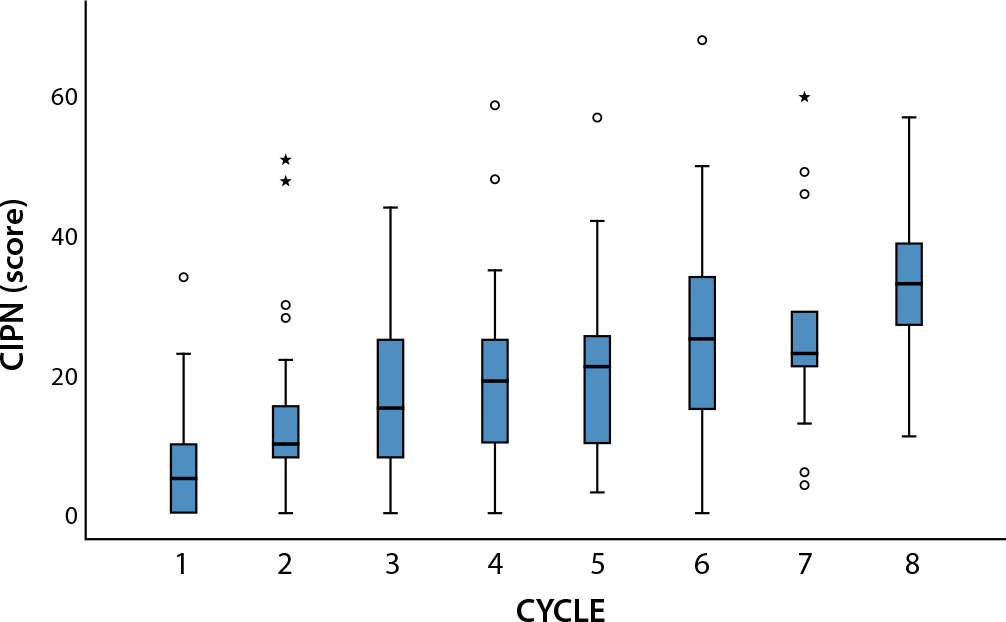
-
ORIGINAL ARTICLE12-16-2023
Elderly Mortality due to Ambulatory Care Sensitive Conditions and Primary Health Care Coverage in the Federal District
Revista Brasileira de Enfermagem. 2023;76(1):e20220170
Abstract
ORIGINAL ARTICLEElderly Mortality due to Ambulatory Care Sensitive Conditions and Primary Health Care Coverage in the Federal District
Revista Brasileira de Enfermagem. 2023;76(1):e20220170
DOI 10.1590/0034-7167-2022-0170
Views0See moreABSTRACT
Objectives:
To describe the mortality coefficients of elderly due to primary care sensitive conditions, from 2008 to 2018, and determine its association with the coverage of the Primary Health Care (Family Health Strategy and Basic Care models) in the Federal District.
Methods:
Ecological time series of mortality in Federal District elderly, from 2008 to 2018. The Poisson regression model was applied, considering as significant those with p<0.05, with a CI of 95%.
Results:
There were 70,503 deaths. There was a decrease in the risk of death of elders due to cardiovascular diseases and diabetes. Higher primary care coverage decreased the chance of death by sensitive conditions, both in Basic Care (OR: 0.994, CI: 0.990-0.998) and in the Family Health Strategy (OR: 0.997, CI: 0.995-0.999).
Conclusions:
Primary Care coverage was associated with a lower chance of death of the elderly due to Ambulatory Care Sensitive Conditions, especially in Basic Care.
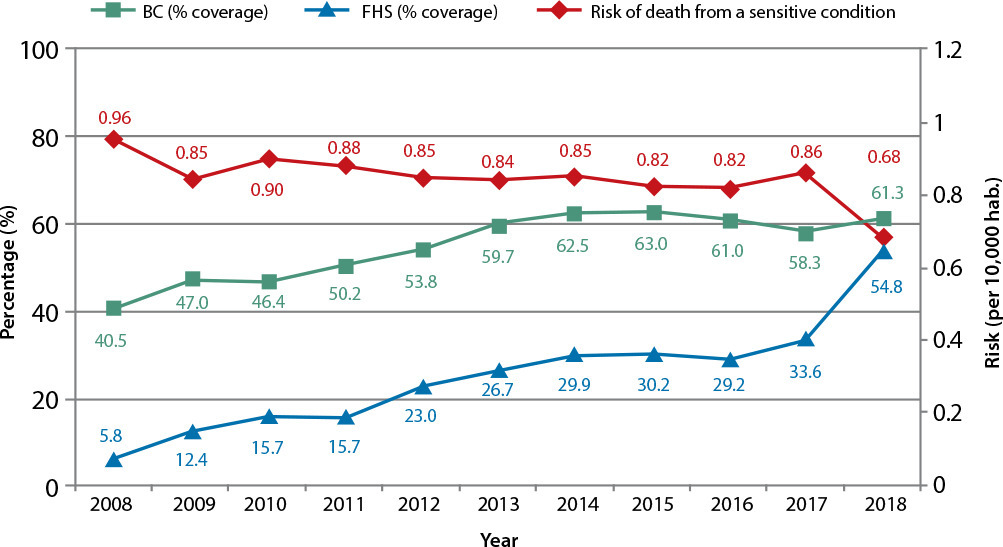
-
ORIGINAL ARTICLE11-28-2023
Syphilis in pregnancy and congenital syphilis: women’s experiences from the perspective of symbolic interactionism
Revista Brasileira de Enfermagem. 2023;76(1):e20220210
Abstract
ORIGINAL ARTICLESyphilis in pregnancy and congenital syphilis: women’s experiences from the perspective of symbolic interactionism
Revista Brasileira de Enfermagem. 2023;76(1):e20220210
DOI 10.1590/0034-7167-2022-0210
Views1See moreABSTRACT
Objectives:
to understand the meanings attributed by women to the diagnosis and treatment of syphilis and congenital syphilis, and to outpatient follow-up of their children.
Methods:
this is a qualitative study conducted with 30 mothers of children with congenital syphilis using audio-recorded semi-structured interviews, which were submitted to inductive thematic analysis. Symbolic interactionism was the theoretical framework considered in this study.
Results:
two themes were identified, showing the maternal diagnosis involved shock, guilt, and fear of social exclusion, in addition to frustration due to failure to prevent vertical transmission. Moreover, the painful clinical procedures for the child’s treatment enhanced maternal guilt, and the symbolic process of re-signification of the disease/treatment took place with the child’s healing.
Final Considerations:
understanding the intersubjective aspects involved in this experience helps nurses rethink their care practice and contributes to their critical role in the context of syphilis.
-
ORIGINAL ARTICLE11-28-2023
Brazilian undergraduate nursing students’ critical thinking need to be increased: a cross-sectional study
Revista Brasileira de Enfermagem. 2023;76(1):e20220315
Abstract
ORIGINAL ARTICLEBrazilian undergraduate nursing students’ critical thinking need to be increased: a cross-sectional study
Revista Brasileira de Enfermagem. 2023;76(1):e20220315
DOI 10.1590/0034-7167-2022-0315
Views0See moreABSTRACT
Objectives:
to map Brazilian undergraduate nursing students’ critical thinking level and investigate the correlation between selected sociodemographic data and critical thinking domains.
Methods:
in this descriptive cross-sectional study, participants’ (N=89) critical thinking was assessed using the Health Science Reasoning Test. Correlation between critical thinking domains and sociodemographic data was assessed using the Pearson correlation coefficient.
Results:
the overall results showed a moderate level of participants’ critical thinking (mean = 70.7; standard deviation 5.7). A poor performance was identified in 5 of the 8 critical thinking domains. A significant positive correlation was found between education period and critical thinking (p<.001).
Conclusions:
poor level in students critical thinking domains may lead to negative consequences for their learning outcomes. Further studies should be carried out to confirm our results, in addition to investigation of teaching methods that encourage and ensure the development of students’ critical thinking skills during nursing education.
-
ORIGINAL ARTICLE02-06-2023
Teaching entrepreneurship in undergraduate Nursing course: evaluation of an educational proposal
Revista Brasileira de Enfermagem. 2023;76(2):e20210244
Abstract
ORIGINAL ARTICLETeaching entrepreneurship in undergraduate Nursing course: evaluation of an educational proposal
Revista Brasileira de Enfermagem. 2023;76(2):e20210244
DOI 10.1590/0034-7167-2021-0244
Views1See moreABSTRACT
Objective:
To evaluate a proposal for teaching entrepreneurship in an undergraduate Nursing course that uses active methodologies and activities based on the theory of meaningful learning.
Methods:
Interventional, prospective study, with a quantitative perspective, with a total of 102 participating students, carried out from July 2017 to December 2019 at a public university in the state of Sao Paulo. Statistical analysis were performed by non-parametric Chi-square or Fisher’s exact tests, with differences considered statistically significant if p < 0.05.
Results:
Improvements were observed in almost all items evaluated, revealing that meaningful learning became more effective with the use of active teaching methodologies. Most students need adaptation and effort to be put into these methods.
Conclusions:
The proposal offers pedagogical content adaptation, specifically for nursing students. New research should expand teaching-learning techniques for the development of future nurses, preparing them adequately for the job market.

-
ORIGINAL ARTICLE03-06-2023
Medication reconciliation in pediatrics: a validation of instruments to prevent medication errors
Revista Brasileira de Enfermagem. 2023;76(2):e20210755
Abstract
ORIGINAL ARTICLEMedication reconciliation in pediatrics: a validation of instruments to prevent medication errors
Revista Brasileira de Enfermagem. 2023;76(2):e20210755
DOI 10.1590/0034-7167-2021-0755
Views0See moreABSTRACT
Objectives:
to develop and validate the content of two instruments for promoting medication reconciliation for the transition of care of hospitalized children.
Methods:
methodological study, conducted in five stages: scope review for conceptual structure; elaboration of the initial version; content validation with five specialists using the Delphi technique; reassessment; and construction of the final version of the instruments. A content validity index of at least 0.80 was adopted.
Results:
three rounds of evaluation were carried out to reach the validity index of the proposed contents, whereas a new analysis of 50% of the 20 items of the instrument aimed at families, and 28.5% of the 21 items aimed at professionals was necessary. The instrument aimed at families reached an index of 0.93, and the instrument for professionals, 0.90.
Conclusions:
the proposed instruments were validated. It is now possible to proceed with practical implementation studies to identify their influence on safety during medication reconciliation at transition of care.

-
ORIGINAL ARTICLE05-08-2023
Precarious work at a surgical center: implications for the organization and for the health of nursing workers
Revista Brasileira de Enfermagem. 2023;76(2):e20220120
Abstract
ORIGINAL ARTICLEPrecarious work at a surgical center: implications for the organization and for the health of nursing workers
Revista Brasileira de Enfermagem. 2023;76(2):e20220120
DOI 10.1590/0034-7167-2022-0120
Views0See moreABSTRACT
Objectives:
to analyze the implications of precarious work for the organization of work and for the health of nursing professionals in a surgical center.
Methods:
qualitative, descriptive study in which the interview technique was applied on 30 nursing professionals from a surgical center in a university hospital located in the Southeast region of Brazil. The project was approved by the research ethics committee. Thematic content analysis was applied in the categorization of speeches.
Results:
precarious work in the surgical center negatively affects the organization of work due to staff turnover, loss of skilled talent, and the need for continuous training of temporary workers. It also affects the quality of care, leading to risks to patient safety and workers’ health.Final Considerations: it is important to make work conditions less precarious in order to minimize staff turnover and promote the quality of the service offered and the health of the worker.
-
ORIGINAL ARTICLE04-07-2023
Suicide attempts by adolescents assisted in an emergency department: a cross-sectional study
Revista Brasileira de Enfermagem. 2023;76(2):e20220137
Abstract
ORIGINAL ARTICLESuicide attempts by adolescents assisted in an emergency department: a cross-sectional study
Revista Brasileira de Enfermagem. 2023;76(2):e20220137
DOI 10.1590/0034-7167-2022-0137
Views1See moreABSTRACT
Objectives:
to identify and characterize the care provided to adolescents admitted to an emergency department due to a suicide attempt.
Methods:
an observational, cross-sectional, descriptive study with a retrospective approach, carried out with medical records of adolescents aged 10 to 19 admitted for suicide attempts, between January 2015 and July 2020, in an emergency department. Data were subjected to descriptive and inferential analysis.
Results:
eighty-eight service occurrences were identified, mainly to females, exposed to multiple risk factors. Exogenous intoxication was the main method used, occurring at home and on weekdays. There were systemic repercussions, requiring multiple interventions and hospitalizations. Only 26% of cases were notified.
Conclusions:
adolescents treated for suicide attempts were exposed to multiple risk factors, with intoxication as the main means used. There is concern about the underreporting of cases and the logic of clinical care and medicalization.
-
ORIGINAL ARTICLE12-13-2019
Hammock and nesting in preterm infants: randomized controlled trial
Revista Brasileira de Enfermagem. 2019;72:96-102
Abstract
ORIGINAL ARTICLEHammock and nesting in preterm infants: randomized controlled trial
Revista Brasileira de Enfermagem. 2019;72:96-102
DOI 10.1590/0034-7167-2018-0099
Views0See moreABSTRACT
Objective:
To compare the physiological variables and the sleep-wake pattern presented by preterm in nesting and hammock positions after diaper change.
Method:
This is a crossover randomized controlled trial. It was conducted with 20 preterm infants who, after diaper change, were placed in nests or hammocks. These preterm infants were evaluated for physiological variables (heart rate and oxygen saturation) and behavioral variables (sleep and wakefulness).
Results:
There was no statistically significant difference in the studied variables between nesting and hammock positions. However, regarding the categorical variable sleep, the comparison between the research phases for the hammock position showed differences between the baseline phase and the immediate recovery (p=0.00), baseline and late recovery (p=0.00), response and immediate recovery (p=0.00), response and late recovery (p=0.00).
Conclusion:
No differences were identified between the nest and the hammock; however, the use of the hammock favored the sleep of preterm infants compared to its non-use.

-
REFLECTION02-15-2021
Pre-hospital assistance by ambulance in the context of coronavirus infections
Revista Brasileira de Enfermagem. 2021;74:e20200657
Abstract
REFLECTIONPre-hospital assistance by ambulance in the context of coronavirus infections
Revista Brasileira de Enfermagem. 2021;74:e20200657
DOI 10.1590/0034-7167-2020-0657
Views0See moreABSTRACT
Objective:
To reflect on the safe care exercised by the pre-hospital care team by emergency ambulance in times of coronavirus infection.
Method:
A reflection and description of how to provide safe care to the patient and the professional during pre-hospital care in times of coronavirus infection.
Results:
To ensure the health of all those involved in the care, health professionals who work in pre-hospital care by emergency ambulance should use the recommended Personal Protective Equipment (PPE), such as the use of surgical masks and N95, N99, N100, PFF2 or PFF3, the use of an apron or overall, goggles and face shield, gloves and a hat. The entire team must receive training and demonstrate the ability to use PPE correctly and safely.
Final considerations:
The professional working in the pre-hospital care by ambulance is exposed to a series of occupational risks that need to be discussed and minimized through professional training.
-
07-05-2021
Selenium concentrations in elderly people with Alzheimer’s disease: a cross-sectional study with control group
Revista Brasileira de Enfermagem. 2021;74:e20200984
Abstract
Selenium concentrations in elderly people with Alzheimer’s disease: a cross-sectional study with control group
Revista Brasileira de Enfermagem. 2021;74:e20200984
DOI 10.1590/0034-7167-2020-0984
Views0See moreABSTRACT
Objective:
To investigate possible differences in plasma and erythrocyte concentrations of selenium among elderly with and without a diagnosis of Alzheimer’s disease (AD).
Methods:
Cross-sectional study, performed with an elderly group with Alzheimer’s disease, diagnosed by a geriatric doctor, and compared to an elderly group without the disease, equaling gender, education, and age. Atomic absorption spectrophotometry determined plasma and erythrocyte concentrations of total selenium (Set).
Results:
The mean age was 74.41±7.1 years in the Alzheimer’s disease group and 71.46±5.1 years among the control group. The Alzheimer’s disease group presented lower plasma concentrations (mean of 45.29±14.51 µg/dL vs. 55.14±14.01 µg/dL; p=0.004), and erythrocyte Set (median of 56.36 µg/L vs. 76.96 µg/L; p<0.001). The logistic regression model indicated an association between erythrocyte Set concentrations and diagnosis of Alzheimer’s disease (p=0.028).
Conclusion:
Elderly with Alzheimer’s disease present lower selenium concentrations in the evaluated organic compartments.
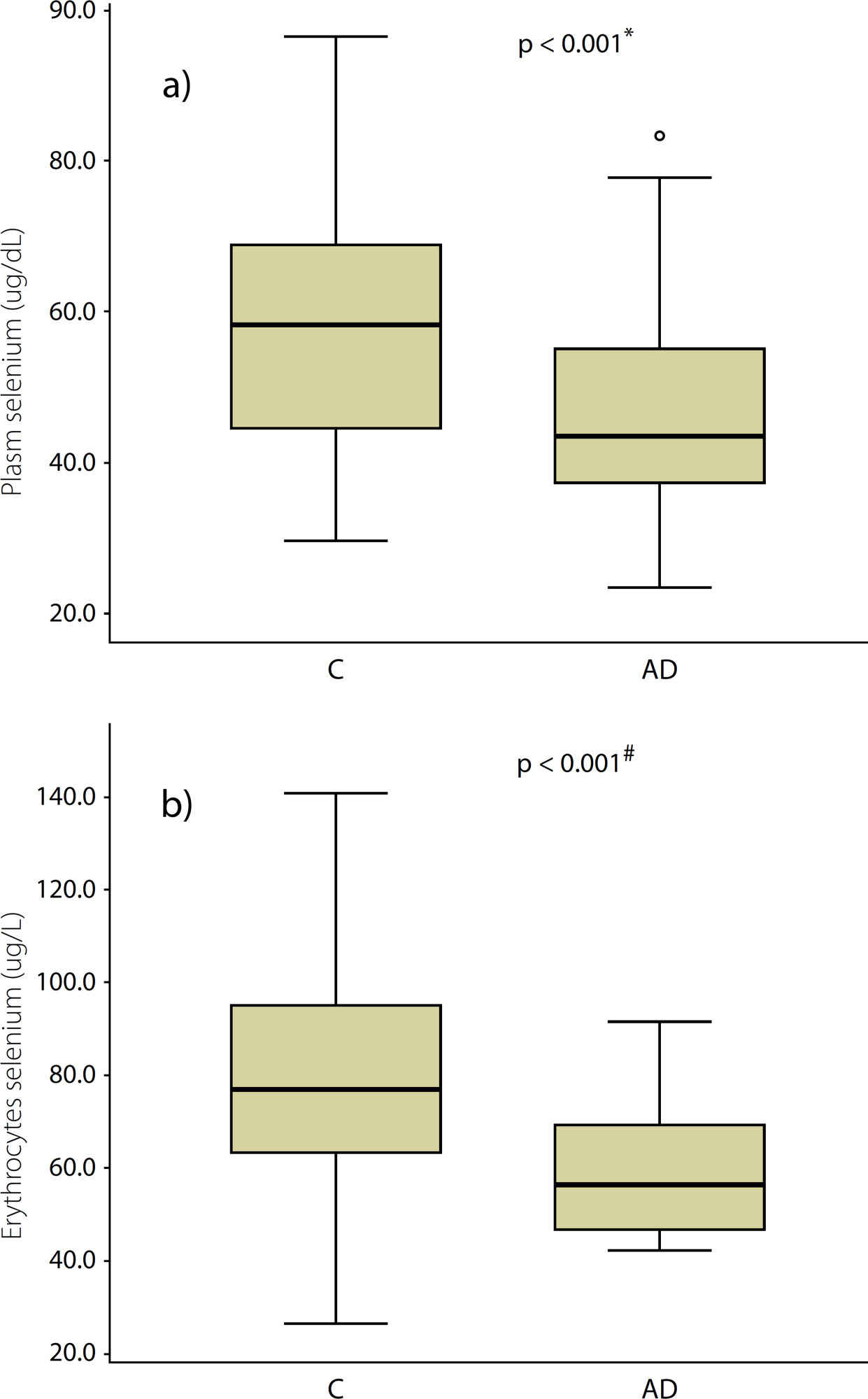
-
REVIEW09-29-2022
Nursing students’ learning from involvement in research projects: an integrative literature review
Revista Brasileira de Enfermagem. 2022;75(1):e20210053
Abstract
REVIEWNursing students’ learning from involvement in research projects: an integrative literature review
Revista Brasileira de Enfermagem. 2022;75(1):e20210053
DOI 10.1590/0034-7167-2021-0053
Views0See moreABSTRACT
Objective:
To identify the learning outcomes and skills obtained of undergraduate nursing students involved in research projects.
Methods:
This was an integrative literature review, based on a research protocol in the CINAHL Complete databases; Cochrane Central Register of Controlled Trials; Cochrane Database of Systematic Reviews; Cochrane Methodology Register; MedicLatina; MEDLINE, Scopus and JBI, including primary and secondary studies, published between 2015 and 2020.
Results:
A total of five heterogeneous articles were included, which were categorized using Kirkpatrick’s (adapted) model. Seventeen learning outcomes acquired through participation in research projects were identified, from the learning of new knowledge and skills to the development of new attitudes and behaviors.
Final considerations:
The involvement of nursing students in research projects is important to their professional development. Future investment in research on this topic can help cement the potential of this type of student involvement.
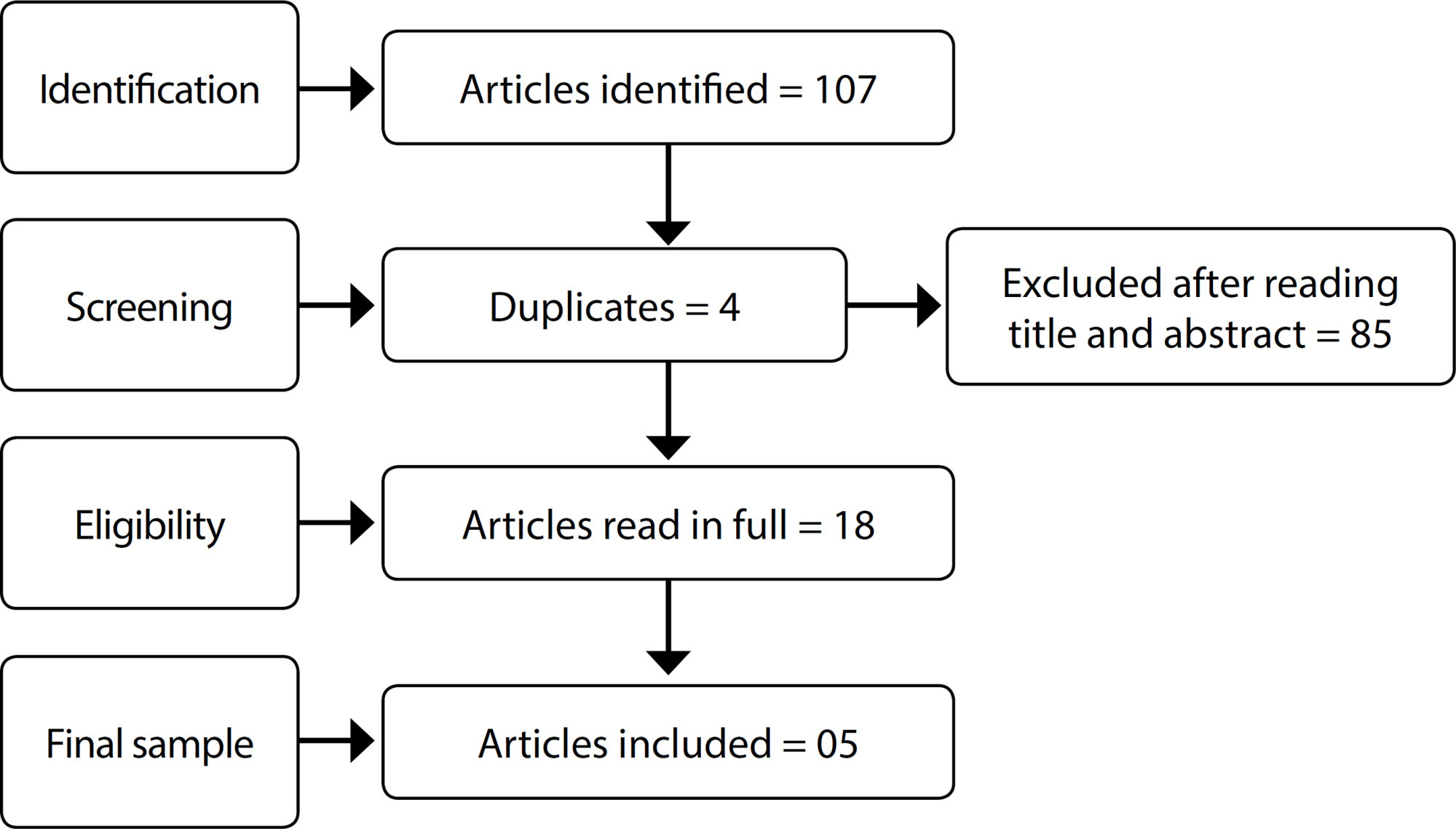
-
REFLECTION07-10-2020
Psychosocial risks and the health of health workers: reflections on Brazilian labor reform
Revista Brasileira de Enfermagem. 2020;73:e20190092
Abstract
REFLECTIONPsychosocial risks and the health of health workers: reflections on Brazilian labor reform
Revista Brasileira de Enfermagem. 2020;73:e20190092
DOI 10.1590/0034-7167-2019-0092
Views0See moreABSTRACT
Objective:
to reflect on the psychosocial risks and their impacts on the health of health workers in light of the Brazilian economic context and Labor Reform.
Method:
reflective study on the Brazilian Labor Reform and its impacts on health of health workers.
Results:
although the changes observed in the labor sphere have contributed to improvements in health and safety policies for, these changes have also contributed to the emergence of new risks arising from work activities, including psychosocial risks, which affect all occupational categories.
Final considerations:
we understand that the Brazilian Labor Reform carried out in 2017 leads to the weakening of labor relations, increases workers’ exposure to risks in the workplace, increases the risk of illness, and opposes the global movement of international organizations aimed at the prevention of aggravation in workers’ health and also at preserving their health.
-
REVIEW03-30-2020
Internet influence on the biopsychosocial health of adolescents: an integratitive review
Revista Brasileira de Enfermagem. 2020;73(2):e20180766
Abstract
REVIEWInternet influence on the biopsychosocial health of adolescents: an integratitive review
Revista Brasileira de Enfermagem. 2020;73(2):e20180766
DOI 10.1590/0034-7167-2018-0766
Views0See moreABSTRACT
Objectives:
To identify scientific evidence on the influence of internet use on adolescents’ biopsychosocial health.
Methods:
Integrative review, with database search, using the descriptors “internet”, “adolescent health” and “adolescent behavior”. After applying the inclusion and exclusion criteria, 16 articles were selected.
Results:
Knowledge convergence produced for three main themes was demonstrated: “Internet exposure time and possible damages to adolescent health”; “Internet, adolescent and cyberbullying”; and “Internet as a source of information for adolescent health”.
Final considerations:
The network involves an intricate network of interactions, providing varied behaviors and attitudes that reflect on adolescent health. Therefore, it is important to articulate nursing actions with the school community and the family, in order to carry out health education.
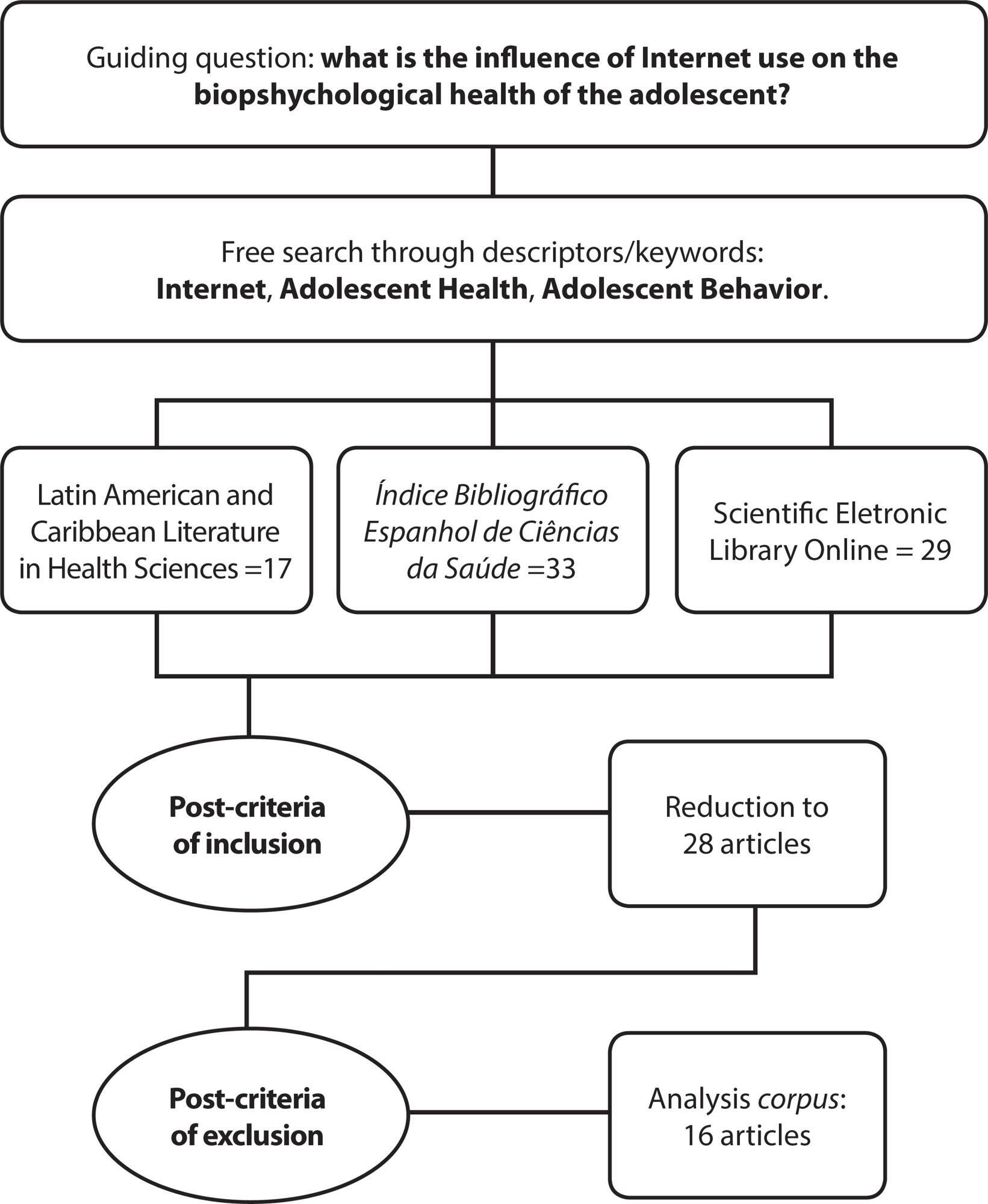
-
ORIGINAL ARTICLE06-16-2021
Patient participation in care safety: Primary Health Care professionals’ perception
Revista Brasileira de Enfermagem. 2021;74(2):e20200773
Abstract
ORIGINAL ARTICLEPatient participation in care safety: Primary Health Care professionals’ perception
Revista Brasileira de Enfermagem. 2021;74(2):e20200773
DOI 10.1590/0034-7167-2020-0773
Views0See moreABSTRACT
Objectives:
to analyze health professionals’ perception about the meaning and practice of patient involvement in care safety in Primary Health Care.
Methods:
this is an exploratory, qualitative study, developed with 22 professionals in the Federal District, Brazil. A semi-structured interview was conducted between October and November/2018. Content analysis was carried out according to Bardin.
Results:
nurses, physicians, dentists, among others, participated. The following categories emerged: Meaning of patient involvement in care safety; Factors intervening in patient involvement in care safety; Strategies for patient involvement in care safety; Qualification for patient involvement in care safety.
Final Considerations:
the meaning of patient involvement for care safety was associated with co-responsibility and patient-centered care. Professionals’ practice revealed intervening factors and the use of involvement strategies. A gap was identified in training on patient involvement in care safety.
-
ORIGINAL ARTICLE10-19-2020
Comfort needs as perceived by hospitalized elders: an analysis under the light of Kolcaba’s theory
Revista Brasileira de Enfermagem. 2020;73:e20190501
Abstract
ORIGINAL ARTICLEComfort needs as perceived by hospitalized elders: an analysis under the light of Kolcaba’s theory
Revista Brasileira de Enfermagem. 2020;73:e20190501
DOI 10.1590/0034-7167-2019-0501
Views0See moreABSTRACT
Objective:
To reveal the Comfort needs as perceived by hospitalized elders, using Kolcaba’s theory.
Methods:
Descriptive and qualitative study, with 11 elders hospitalized in a university hospital, aiming to identify their needs for Comfort.
Results:
Discourses were categorized in four thematic units: Physical, Environmental, Sociocultural, and Psychospiritual. In the Physical context, several subcategories were found, namely, Symptom Relief; Daily Life Activities; Hygiene and personal care; Diet; Sleep and rest. In the Environmental context, the Comfort was considered to be superior than in the elders’ home; in the Sociocultural one, family bonds were found to become more distant, triggering feelings of missing one’s family and isolation, in the Psychospiritual context, spirituality and religiosity stood out.
Final considerations:
The Comfort needs of the hospitalized elders enable one to reflect on nursing care, offering information to improve the quality of assistance and to attend to the real needs of the elderly.
Search
Search in:
Nuvem de Tags
Adolescente (85) Atenção Primária à Saúde (239) COVID-19 (91) Criança (91) Cuidados de Enfermagem (269) Educação em Enfermagem (151) Educação em Saúde (139) Enfermagem (930) Enfermagem Pediátrica (86) Estudantes de Enfermagem (77) Estudos de Validação (131) Família (87) Idoso (208) Promoção da Saúde (99) Qualidade de Vida (104) Saúde do Trabalhador (86) Saúde Mental (145) Saúde Pública (82) Segurança do Paciente (150) Tecnologia Educacional (100)



